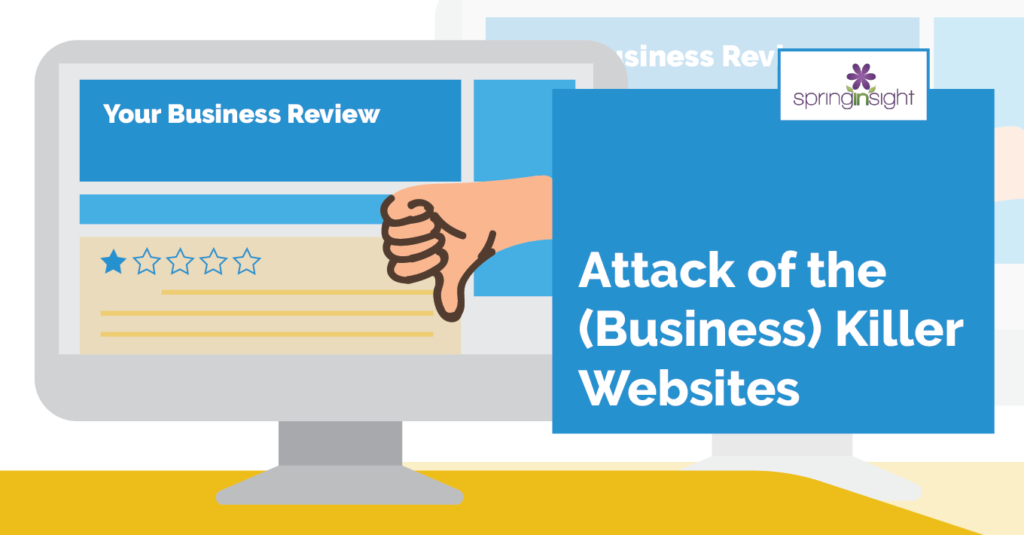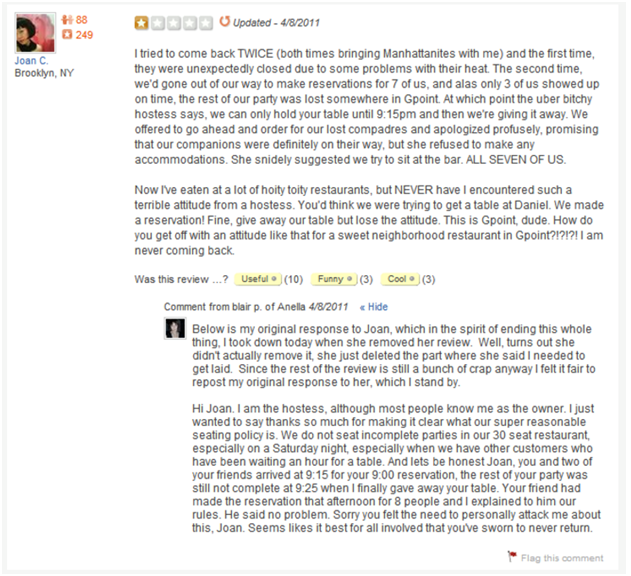
Attack of the (Business) Killer Websites
We spend a good portion of our daily lives online and that can be a great thing. Information about everything from the best car to buy to the newest way to consume pumpkin spice is immediately available to us 24/7. The flipside of living in an age that is so engaged online, though, is that a bad review can destroy your business faster than a time-traveling DeLorean.
So what specific attacks should you prepare for and what can you do to protect your online reputation?
Bad reviews on websites (e.g., OpenTable, Yelp, Google Reviews, the list goes on) and social media (e.g., Facebook or Twitter)
Contrary to that old adage, the customer is NOT always right…People sometimes post in anger or when they do not get their way (no matter how unreasonable they are being). And this matters because nearly 9 out of 10 users say they read reviews of local businesses to help them decide where to spend their hard-earned dollars. Unfortunately, the anonymity of the Internet allows people to vent their feelings usually without having to face any social fallout. We all know that online reviews should be taken with a grain of salt. But you can’t be sure that your potential customers have that in mind while they’re reading a bad review about your business.
Other websites that can be bad for companies are ripoffreport.com and consumeraffairs.com
While they appear to be reputable websites with the commendable goal of protecting the vulnerable consumer, these websites troll on bad reviews and they can destroy all of the lovely SEO you have worked so hard to build. (Seriously, they are great at showing up in the #2 spot in search results.) The fact is these types of websites can kill business for months or even years. The worst thing you can do is to ignore the problem.
So how should you respond?
First, take a deep breath (Think: Namaste). No matter what, resist the urge to post an angry response. Next, reach out to the unsatisfied reviewer via whatever forum they used. It’s worth putting some thought into crafting a professional response. If a negative comment is unfair, don’t be afraid to tell your side of the story. This is a good example of a calm and measured response to an angry Yelper:
Sometimes negative feedback is unfair. Other times, the reviewer makes some good points. If, for some reason, you do receive accurate, negative feedback, own up to the mistake. Apologize and explain what you are doing to remedy the problem. Here’s a great example of this:
What I like about this response is that it addresses specific complaints mentioned in the review with specific solutions in a non-defensive way. It says, “You’re right. We screwed up. I’m so sorry. Here’s what we are doing to fix things.” Even if a particular customer remains stubbornly unhappy, others will see the exchange. Your goal should always be the same…to show that you care.
Monitoring Your Online Reputation with Google Alerts
In addition, if you aren’t already using Google Alerts to monitor your online reputation, get on it! Google Alerts sends you a notification whenever someone says something about you or your company online. Why should you wait months to hear about a negative (or positive) comment from a friend? Knowing about problems as soon as they arise allows you to be proactive. Keep in mind that the most important tool you have for protecting your online presence is dealing with issues in a professional manner.
I would tell you more, but my Grande, sugar-free, non-fat, vanilla soy, double shot, decaf, no foam, extra hot, pumpkin spice latte, with light whip and extra syrup had my name misspelled (It’s Erika, NOT Erica!), so I need to get on Yelp to complain.



Online reputation is very important these days. Thanks for the article and advices.